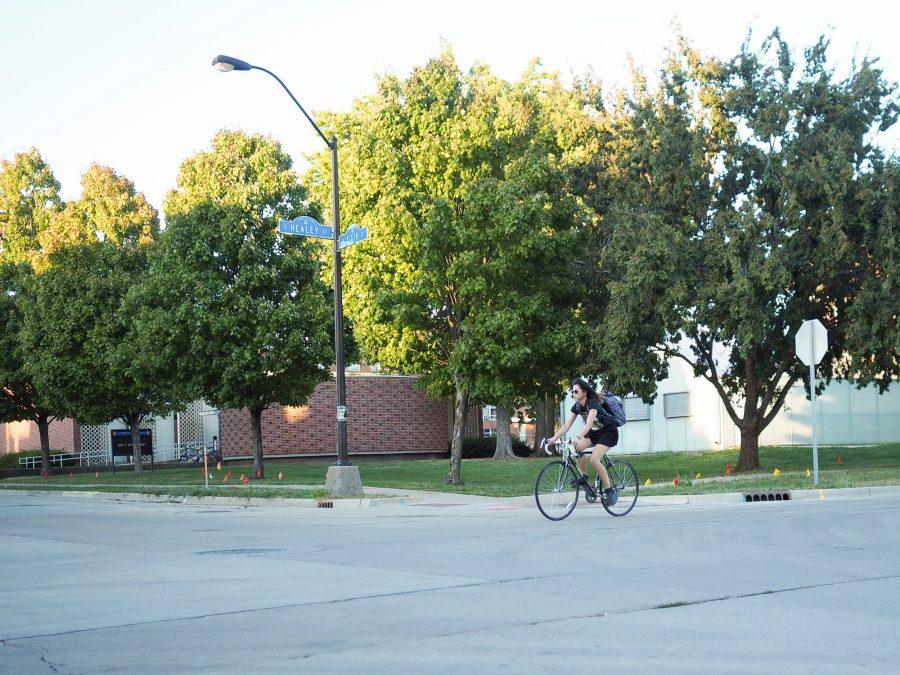Student project benefits bicyclists
Student bikes through Sixth and Healey intersection in Champaign, IL. October 11, 2016.
October 18, 2016
Whereas most freshman entering college are concerned about getting lost on campus, making friends and learning how to do laundry, Samantha Walter, Sarah Conroy, Mardy Hillengas and Karolina Urban had a bigger challenge on their plate.
Before the start of the fall semester, the four incoming Engineering students had already developed Roly Poly, a project designed to help the community through the University’s Summer Scholars Program by focusing on bicyclists.
“The original intention of our project, dubbed Roly Poly, was to design a system to track individual bicycles by location and time on the University of Illinois campus,” Walter said. “This tracking system would collect data that would help the University allocate funds for developing cycling infrastructure. We also hope to encourage cycling on campus by creating a reward system and help locate stolen bikes.”
Walter serves as the communications coordinator for the project while Conroy is the head of code. Hillengas is the artistic director and Urban acts as the head of construction. The women are currently finishing up a prototype on the project with a budget of only $100.
The project will incorporate Radio Frequency Identification tagging on bicycles to track how often they pass determined locations on campus. This data would allow researchers to determine students’ collective biking habits, as well as make predictions and observations regarding traffic patterns. Walter said that the information gained from the project would help the University “efficiently devote funds to improve safety and infrastructure” in order to decrease congestion and accidents.
Get The Daily Illini in your inbox!
Through an additional incentive program, the project would also assist with the improvement of student and staff health. The team is currently unsure of how they would like to approach the rewards system, but is leaning toward two solutions: a collective point system, in which cyclists could redeem points they earn by biking certain distances for prizes, or a daily raffle for those who had biked throughout the day.
Lily Wilcock, the active transportation coordinator of the University, initially approached the Summer Scholars course instructor, Joe Bradley, with the idea for the project. Wilcock developed the idea as a way to “not just dis-incentivize car-driving, but to incentivize active transportation.” She cites the University of Minnesota and the Ohio State University as examples of places where Radio Frequency Identofication programs have previously worked and has been inspired to implement similar systems here at the University.
“What the University of Minnesota has been able to do with their incentive program is actually go to health insurance companies and say, ‘look at all of these people doing healthy things,’ and now they have a discount program for health insurance,” Wilcock said. “Then, it goes from ‘Why would I bike?’ to ‘Why would I not bike?’”
Apart from this emerging program, the Facilities and Services department offers other projects and resources to encourage cycling. One of the most popular projects is their “Light the Night” program, which provides free bike light sets to students every September. The Campus Bicycle Center is also a good resource for students who are more interesting in cycling.
“We have educated staff members that help teach people how to work on bikes, and then we also refurbish bikes that we have donated and we have those for sale,” Jake Benjamin, manager of the Bicycle Center, said about the services it provides.
Facilities and Services has made a strong effort to facilitate cycling on campus by providing students with cheap, easy-access options to find help with their bicycle issues should any arise. The new Radio Frequency Identification program still has a while to go before it is finished, so these resources are the main encouragement for cycling today.
“The University is a very compact area and it’s being developed very quickly,” Benjamin said. “With it being such a small town, you can get around very easily. (Cycling) is a very effective way to get around, it’s a very cheap way to get around, it’s exercise, it’s good for the planet and it’s good for you.”







